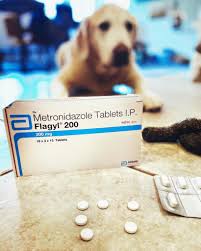Metronidazole (Flagyl) is an antibiotic that’s used to treat a variety of bacterial and protozoal infections. It works by stopping the growth of certain bacteria and protozoa. This medication is particularly effective against anaerobic bacteria, which are bacteria that do not need oxygen to grow. It is commonly used to treat conditions such as bacterial vaginosis, certain skin and tissue infections, bone and joint infections, gastrointestinal infections like Clostridium difficile-associated diarrhea, and infections caused by Trichomonas parasites.
What is Metronidazole For Dogs Used For?
In veterinary medicine, metronidazole is used to treat similar types of infections in animals, particularly dogs and cats. It can be used for infections in the gastrointestinal tract, which are often caused by anaerobic bacteria. It’s also sometimes used to treat other conditions such as Giardia, which commonly causes inflammatory bowel disease, or to manage symptoms like diarrhea. However, it’s important to use this medication under the supervision of a veterinarian, as it can have side effects and isn’t suitable for all pets or all types of infections.
What is Dosage and Administration of Metronidazole For Dogs?
Metronidazole is usually prescribed by veterinarians to treat various infections in dogs, particularly those involving the gastrointestinal tract. The dosage and the method of administration can vary depending on the condition being treated, the size of the dog, and the dog’s overall health.
General Metronidazole Dosage Guidelines
- Typical Dosage: For dogs, the usual dosage of metronidazole ranges from 5 to 25 milligrams per kilogram (mg/kg) of the dog’s body weight. This dosage is typically given 1 to 2 times per day.
- Duration: The length of the treatment depends on the specific condition being treated and how the dog responds to the medication. It could be a few days to several weeks.
Administration
- Form: Metronidazole is available in both tablet and liquid forms. Tablets are the most common form used for dogs.
- Oral Administration: It is usually given orally, and can be given with food to help reduce gastrointestinal upset, which is a common side effect.
- Following Veterinarian Instructions: It’s important to follow the dosage and administration instructions provided by the veterinarian closely. Stopping the medication too early, even if the pet seems to be better, can lead to a recurrence of the infection.
What Are The Side Effects of Metronidazole For Dogs?
Metronidazole can be an effective treatment for various infections in dogs, but like all medications, it may cause side effects in some animals. Here’s a detailed look at the potential side effects associated with metronidazole in dogs:
Common Side Effects
These are generally mild and may include:
- Gastrointestinal Issues: Nausea, vomiting, diarrhea, and loss of appetite are common. These symptoms can sometimes be managed by administering the medication with food.
- Lethargy: Dogs may appear unusually tired or sluggish.
Neurological Side Effects
These can be more serious but are usually reversible once the medication is discontinued:
- Neurotoxic Effects: In rare cases, high doses or prolonged use of metronidazole can lead to neurotoxicity. Symptoms may include:
- Ataxia: Lack of muscle coordination, stumbling, or unsteadiness.
- Twitching or Seizures: Involuntary twitching or convulsions can occur in severe cases.
- Disorientation or Stiffness: Dogs may appear confused or exhibit unusual stiffness.
- Nystagmus: Rapid, involuntary eye movements.
- Tilting the Head: This can be a sign of vestibular disturbances.
Allergic Reactions
Though rare, some dogs might have an allergic reaction to the medication, which could include:
- Skin Rash: Hives or patches of red, irritated skin.
- Swelling: Particularly around the face or lips.
- Difficulty Breathing: Signs of severe allergic reactions may include wheezing or gasping.
Other Considerations
- Liver Impact: Since metronidazole is metabolized by the liver, dogs with pre-existing liver conditions could be at higher risk of adverse effects.
- Blood Reactions: There have been reports of metronidazole causing blood dyscrasias, such as neutropenia (a decrease in the number of white blood cells), though this is extremely rare.
Managing and Monitoring
If your dog is prescribed metronidazole, it’s important to monitor them closely for any signs of adverse effects. If you observe any unusual symptoms, particularly those related to the nervous system, contact your veterinarian immediately. Your vet may adjust the dosage or switch to a different medication based on the dog’s response and side effects.
Always ensure that the treatment is completed as prescribed unless directed otherwise by a veterinarian, even if your dog starts to show improvement, to avoid recurrence of the infection and resistance to the antibiotic.
Are There Any Natural Alternatives to Metronidazole For Dogs With Diarrhea?
There are several natural alternatives to metronidazole for treating diarrhea in dogs, which can be especially useful given the potential side effects and concerns about overuse and antibiotic resistance associated with metronidazole.
- Fasting: Temporarily fasting your dog can give their digestive system a break and help alleviate diarrhea. It’s important to ensure they stay hydrated during this period and to reintroduce food gradually.
- Healthy Diet: Offering a bland diet consisting of easily digestible foods like cooked white fish, turkey, sweet potatoes, and pumpkin can help soothe your dog’s digestive system. Incorporating bone broth can also be beneficial due to its nourishing properties.
- Herbal Remedies:
- Slippery Elm: Known for its soothing properties, it helps by promoting mucous secretion, which can relieve stomach irritation and diarrhea.
- Marshmallow Root: This herb acts as a soothing agent for the gastrointestinal tract, reducing inflammation.
- Coptis: This Chinese herbal remedy contains berberine, an antibacterial compound effective against various gastrointestinal issues.
- Probiotics and Prebiotics: These supplements can help restore and maintain healthy gut flora, which can be disrupted by diarrhea.
- Bach Flower Remedies: These can be used to address stress-induced diarrhea by calming your dog’s emotional stress.
- Digestive Enzymes: These supplements aid in digestion and can help prevent malabsorption issues.
These methods focus on managing symptoms naturally and promoting long-term gut health, avoiding the potential side effects associated with metronidazole. However, it’s important to consult with your veterinarian before starting any new treatment to ensure it’s appropriate for your dog’s specific health needs
Interactions Between Metronidazole and Other Medications
When administering metronidazole to dogs, it’s important to be cautious about combining it with certain other medications or substances due to potential interactions or increased side effects. Here are some substances and medications that should generally be avoided or used with caution when a dog is being treated with metronidazole:
- Alcohol: Avoid giving your dog foods or products that contain alcohol while they are taking metronidazole. The combination can cause severe nausea, vomiting, and rapid heart rate.
- Warfarin: Metronidazole can increase the anticoagulant effects of warfarin, leading to an increased risk of bleeding. Regular monitoring and dosage adjustments may be necessary.
- Cimetidine: This medication, used to reduce stomach acid, can interfere with the metabolism of metronidazole, potentially increasing its side effects by causing higher blood levels of the antibiotic.
- Phenobarbital: Used to control seizures, phenobarbital can decrease the effectiveness of metronidazole by increasing its metabolism in the liver.
- Some Chemotherapy Agents: Metronidazole can interact with certain chemotherapy drugs, altering their effectiveness or increasing toxicity.
- Other Antibiotics: Combining metronidazole with certain other antibiotics can either potentiate their effects or cause antagonistic interactions.
Because of the potential for drug interactions, it’s crucial to inform your veterinarian about all medications, supplements, and over-the-counter products your dog is currently using before starting treatment with metronidazole. This will help avoid any adverse effects and ensure the safety and effectiveness of the treatment.
Conclusion
Metronidazole is a commonly used antibiotic for treating various bacterial and protozoal infections in dogs, particularly those affecting the gastrointestinal tract. When administered, it’s generally recommended to be given with food to minimize gastrointestinal side effects such as nausea and vomiting. The medication typically starts to show effects within 24 to 48 hours, but it’s crucial to complete the full course as prescribed by a veterinarian to fully eradicate the infection and prevent resistance. Caution is advised when combining metronidazole with other substances or medications such as alcohol, warfarin, cimetidine, phenobarbital, certain chemotherapy agents, and other antibiotics, due to potential interactions or increased side effects. Always consult with a veterinarian before starting treatment with metronidazole to ensure it’s appropriate for your dog’s specific health situation and to avoid any adverse interactions with other medications.
Frequently Asked Question About Metronidazole For Dogs
Should metronidazole be taken with food for dogs?
Yes, metronidazole should generally be taken with food when administered to dogs. Taking it with food can help reduce gastrointestinal side effects such as nausea and vomiting, which are relatively common when metronidazole is given on an empty stomach. Additionally, administering it with food can improve the absorption of the medication in some cases. Always follow the specific instructions provided by your veterinarian, as they may have tailored advice based on your dog’s particular health situation and the condition being treated.
How fast does metronidazole work?
Metronidazole typically begins to show effects fairly quickly, often within a few hours to a day after the first dose, depending on the infection being treated. For gastrointestinal conditions, improvements in symptoms can usually be observed within 24 to 48 hours. However, the exact time frame can vary based on the severity of the condition, the dosage administered, and individual response to the medication.
It’s important for the full course of the medication to be completed as prescribed by a veterinarian, even if the dog seems to improve quickly. This helps ensure that the infection is fully eradicated and helps prevent resistance to the antibiotic.
How does metronidazole make dogs feel?
Metronidazole can affect dogs in various ways, depending on the individual dog’s sensitivity to the medication and the dosage administered. Generally, most dogs tolerate metronidazole well, but some may experience side effects that can impact how they feel during treatment. Here are some common reactions:
- 1. Gastrointestinal Discomfort: Some dogs may experience nausea, vomiting, or a loss of appetite. This can make them less willing to eat or appear lethargic.
- 2. Neurological Effects: In rare cases, especially with higher doses or prolonged use, metronidazole can cause neurological symptoms such as unsteadiness, twitching, seizures, or other changes in behavior. These symptoms can make a dog appear disoriented or anxious.
- 3. General Lethargy: Dogs may also show signs of general tiredness or lethargy, which could be due to the body’s response to fighting an infection or the side effects of the medication itself.











